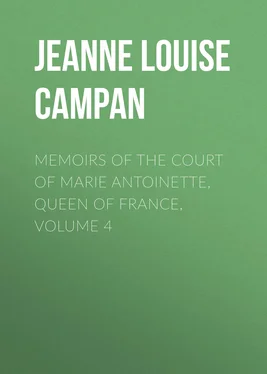Jeanne Louise Henriette Campan - Memoirs of the Court of Marie Antoinette, Queen of France, Volume 4
Здесь есть возможность читать онлайн «Jeanne Louise Henriette Campan - Memoirs of the Court of Marie Antoinette, Queen of France, Volume 4» — ознакомительный отрывок электронной книги совершенно бесплатно, а после прочтения отрывка купить полную версию. В некоторых случаях можно слушать аудио, скачать через торрент в формате fb2 и присутствует краткое содержание. Жанр: Биографии и Мемуары, История, foreign_edu, foreign_antique, foreign_prose, на английском языке. Описание произведения, (предисловие) а так же отзывы посетителей доступны на портале библиотеки ЛибКат.
- Название:Memoirs of the Court of Marie Antoinette, Queen of France, Volume 4
- Автор:
- Жанр:
- Год:неизвестен
- ISBN:нет данных
- Рейтинг книги:3 / 5. Голосов: 1
-
Избранное:Добавить в избранное
- Отзывы:
-
Ваша оценка:
- 60
- 1
- 2
- 3
- 4
- 5
Memoirs of the Court of Marie Antoinette, Queen of France, Volume 4: краткое содержание, описание и аннотация
Предлагаем к чтению аннотацию, описание, краткое содержание или предисловие (зависит от того, что написал сам автор книги «Memoirs of the Court of Marie Antoinette, Queen of France, Volume 4»). Если вы не нашли необходимую информацию о книге — напишите в комментариях, мы постараемся отыскать её.
Memoirs of the Court of Marie Antoinette, Queen of France, Volume 4 — читать онлайн ознакомительный отрывок
Ниже представлен текст книги, разбитый по страницам. Система сохранения места последней прочитанной страницы, позволяет с удобством читать онлайн бесплатно книгу «Memoirs of the Court of Marie Antoinette, Queen of France, Volume 4», без необходимости каждый раз заново искать на чём Вы остановились. Поставьте закладку, и сможете в любой момент перейти на страницу, на которой закончили чтение.
Интервал:
Закладка:
This audacious reply filled the Queen of Naples with indignation, and her emotion caused her to miscarry on the same day. In consequence of the mediation of Louis XVI. the Queen of Naples obtained complete satisfaction, and Mr. Acton continued Prime Minister.
Among the characteristics which denoted the goodness of the Queen, her respect for personal liberty should have a place. I have seen her put up with the most troublesome importunities from people whose minds were deranged rather than have them arrested. Her patient kindness was put to a very disagreeable trial by an ex-councillor of the Bordeaux Parliament, named Castelnaux; this man declared himself the lover of the Queen, and was generally known by that appellation. For ten successive years did he follow the Court in all its excursions. Pale and wan, as people who are out of their senses usually are, his sinister appearance occasioned the most uncomfortable sensations. During the two hours that the Queen's public card parties lasted, he would remain opposite her Majesty. He placed himself in the same manner before her at chapel, and never failed to be at the King's dinner or the dinner in public. At the theatre he invariably seated himself as near the Queen's box as possible. He always set off for Fontainebleau or St. Cloud the day before the Court, and when her Majesty arrived at her various residences, the first person she met on getting out of her carriage was this melancholy madman, who never spoke to any one. When the Queen stayed at Petit Trianon the passion of this unhappy man became still more annoying. He would hastily swallow a morsel at some eating-house, and spend all the rest of the day, even when it rained, in going round and round the garden, always walking at the edge of the moat. The Queen frequently met him when she was either alone or with her children; and yet she would not suffer any violence to be used to relieve her from this intolerable annoyance. Having one day given M. de Seze permission to enter Trianon, she sent to desire he would come to me, and directed me to inform that celebrated advocate of M. de Castelnaux's derangement, and then to send for him that M. de Seze might have some conversation with him. He talked to him nearly an hour, and made considerable impression upon his mind; and at last M. de Castelnaux requested me to inform the Queen positively that, since his presence was disagreeable to her, he would retire to his province. The Queen was very much rejoiced, and desired me to express her full satisfaction to M. de Seze. Half an hour after M. de Seze was gone the unhappy madman was announced. He came to tell me that he withdrew his promise, that he had not sufficient command of himself to give up seeing the Queen as often as possible. This new determination: was a disagreeable message to take to her Majesty but how was I affected at hearing her say, "Well, let him annoy me! but do not let him be deprived of the blessing of freedom."
[On the arrest of the King and Queen at Varennes, this unfortunate Castelnaux attempted to starve himself to death. The people in whose house he lived, becoming uneasy at his absence, had the door of his room forced open, when he was found stretched senseless on the floor. I do not know what became of him after the 10th of August.—MADAME CAMPAN.]
The direct influence of the Queen on affairs during the earlier years of the reign was shown only in her exertions to obtain from the King a revision of the decrees in two celebrated causes. It was contrary to her principles to interfere in matters of justice, and never did she avail herself of her influence to bias the tribunals. The Duchesse de Praslin, through a criminal caprice, carried her enmity to her husband so far as to disinherit her children in favour of the family of M. de Guemenee. The Duchesse de Choiseul, who, was warmly interested in this affair, one day entreated the Queen, in my presence, at least to condescend to ask the first president when the cause would be called on; the Queen replied that she could not even do that, for it would manifest an interest which it was her duty not to show.
If the King had not inspired the Queen with a lively feeling of love, it is quite certain that she yielded him respect and affection for the goodness of his disposition and the equity of which he gave so many proofs throughout his reign. One evening she returned very late; she came out of the King's closet, and said to M. de Misery and myself, drying her eyes, which were filled with tears, "You see me weeping, but do not be uneasy at it: these are the sweetest tears that a wife can shed; they are caused by the impression which the justice and goodness of the King have made upon me; he has just complied with my request for a revision of the proceedings against Messieurs de Bellegarde and de Monthieu, victims of the Duc d'Aiguillon's hatred to the Duc de Choiseul. He has been equally just to the Duc de Guines in his affair with Tort. It is a happy thing for a queen to be able to admire and esteem him who has admitted her to a participation of his throne; and as to you, I congratulate you upon your having to live under the sceptre of so virtuous a sovereign."
The Queen laid before the King all the memorials of the Duc de Guines, who, during his embassy to England, was involved in difficulties by a secretary, who speculated in the public funds in London on his own account, but in such a manner as to throw a suspicion of it on the ambassador. Messieurs de Vergennes and Turgot, bearing but little good-will to the Duc de Guines, who was the friend of the Duc de Choiseul, were not disposed to render the ambassador any service. The Queen succeeded in fixing the King's particular attention on this affair, and the innocence of the Duc de Guines triumphed through the equity of Louis XVI.
An incessant underhand war was carried on between the friends and partisans of M. de Choiseul, who were called the Austrians, and those who sided with Messieurs d'Aiguillon, de Maurepas, and de Vergennes, who, for the same reason, kept up the intrigues carried on at Court and in Paris against the Queen. Marie Antoinette, on her part, supported those who had suffered in this political quarrel, and it was this feeling which led her to ask for a revision of the proceedings against Messieurs de Bellegarde and de Monthieu. The first, a colonel and inspector of artillery, and the second, proprietor of a foundry at St. Etienne, were, under the Ministry of the Duc d'Aiguillon, condemned to imprisonment for twenty years and a day for having withdrawn from the arsenals of France, by order of the Duc de Choiseul, a vast number of muskets, as being of no value except as old iron, while in point of fact the greater part of those muskets were immediately embarked and sold to the Americans. It appears that the Duc de Choiseul imparted to the Queen, as grounds of defence for the accused, the political views which led him to authorise that reduction and sale in the manner in which it had been executed. It rendered the case of Messieurs de Bellegarde and de Monthieu more unfavourable that the artillery officer who made the reduction in the capacity of inspector was, through a clandestine marriage, brother-in-law of the owner of the foundry, the purchaser of the rejected arms. The innocence of the two prisoners was, nevertheless, made apparent; and they came to Versailles with their wives and children to throw themselves at the feet of their benefactress. This affecting scene took place in the grand gallery, at the entrance to the Queen's apartment. She wished to restrain the women from kneeling, saying that they had only had justice done them; and that she ought to be congratulated upon the most substantial happiness attendant upon her station, that of laying just appeals before the King.
On every occasion, when the Queen had to speak in public, she used the most appropriate and elegant language, notwithstanding the difficulty a foreigner might be expected to experience. She answered all addresses herself, a custom which she learned at the Court of Maria Theresa. The Princesses of the House of Bourbon had long ceased to take the trouble of speaking in such cases. Madame Addlaide blamed the Queen for not doing as they did, assuring her that it was quite sufficient to mutter a few words that might sound like an answer, while the addressers, occupied with what they had themselves been saying, would always take it for granted that a proper answer had been returned. The Queen saw that idleness alone dictated such a proceeding, and that as the practice even of muttering a few words showed the necessity of answering in some way, it must be more proper to reply simply but clearly, and in the best style possible. Sometimes indeed, when apprised of the subject of the address, she would write down her answer in the morning, not to learn it by heart, but in order to settle the ideas or sentiments she wished to introduce.
Читать дальшеИнтервал:
Закладка:
Похожие книги на «Memoirs of the Court of Marie Antoinette, Queen of France, Volume 4»
Представляем Вашему вниманию похожие книги на «Memoirs of the Court of Marie Antoinette, Queen of France, Volume 4» списком для выбора. Мы отобрали схожую по названию и смыслу литературу в надежде предоставить читателям больше вариантов отыскать новые, интересные, ещё непрочитанные произведения.
Обсуждение, отзывы о книге «Memoirs of the Court of Marie Antoinette, Queen of France, Volume 4» и просто собственные мнения читателей. Оставьте ваши комментарии, напишите, что Вы думаете о произведении, его смысле или главных героях. Укажите что конкретно понравилось, а что нет, и почему Вы так считаете.












